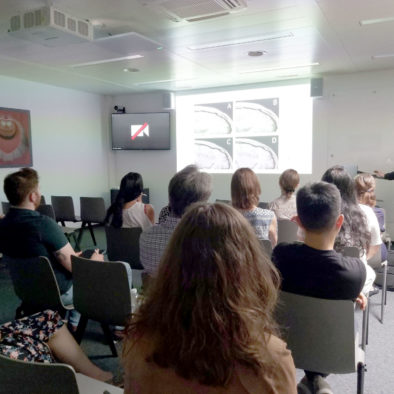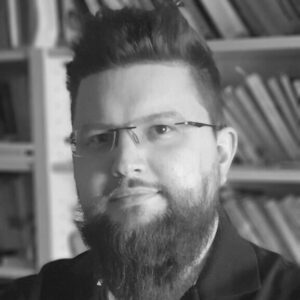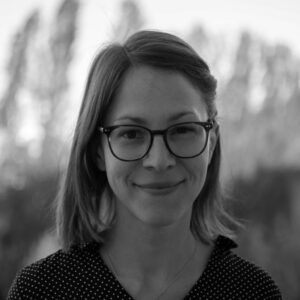
On 27th June 2023, CIBM held its 2023 Summer Edition of the 35th CIBM Breakfast & Science Seminar chaired by Dr. Sebastien Courvoisier and Dr. Meritxel Bach Cuadra
Oscar Dabrowski,
PhD student
University of Geneva, Faculty of Sciences, Department of Computer Science & Department of Radiology and Medical Informatics
Detecting, quantifying, and correcting MRI motion artifacts in k-space
Abstract:
Despite continuous progress and ongoing research, patient motion in MRI remains a major issue. The method we propose combines artificial neural networks and a model-based approach to estimate the motion of rigid objects directly in k-space. By working directly in k-space, we can leverage the raw data where motion is localized, as opposed to image space where motion is distributed throughout the entire image. Once the motion is estimated, we use the Non-Uniform Fourier Transform framework to reconstruct the image, producing a corrected image that is almost free from motion artifacts.
About the speaker:
Oscar Dabrowski is currently doing a PhD at the University of Geneva (UNIGE) under the supervision of Dr. Sébastien Courvoisier and with Pr François Lazeyras and Pr Bastien Chopard as thesis directors. The goal of his PhD thesis is the detection and correction of motion artifacts in MRI acquisitions, directly in k-space. Oscar Dabrowski holds a BSc (HEPIA, 2013) and an MSc (UNIGE, 2017), both in computer science. During his PhD, he was also a teaching assistant at UNIGE (computer science).
Supervisors: François Lazeyras, Sébastien Courvoisier (UNIGE)
Hélène Lajous,
Research Staff Scientist
CIBM SP CHUV-UNIL Computational Neuroanatomy & Fetal Imaging Section, Medical Image Analysis Laboratory (MIAL)
FaBiAN, a Fetal Brain magnetic resonance Acquisition Numerical phantom to simulate images of the developing human brain
Abstract:
Fetal magnetic resonance imaging (MRI) has become a pivotal imaging modality complementary to the ultrasound gold-standard in the monitoring of pregnancies, especially in equivocal situations with suspected abnormal neurological patterns. In clinical routine, two-dimensional thick slices are acquired using T2-weighted fast spin echo (FSE) sequences to ensure a good signal-to-noise ratio over the whole fetal brain volume and avoid unpredictable movements of the fetus during the acquisition. Numerical phantoms can mitigate the scarcity of good quality data in this sensitive population by providing a controlled environment with a known ground truth to support the development and validation of advanced analysis methods.
During this talk, I will walk you, both newbies and MR physics aficionados, through the subtleties of FSE sequences in the context of fetal brain MRI. I will then present the first Fetal Brain MR Acquisition Numerical phantom (FaBiAN) that has been developed in our lab to simulate realistic T2-weighted MR images of the brain throughout in utero maturation. Finally, we will explore some applications, including the optimization of advanced super-resolution reconstruction techniques, and in silico data augmentation for supervised fetal brain multi-tissue segmentation.
About the speaker:
Hélène is a post-doctoral researcher in the CIBM SP CHUV-UNIL Computational Neuroanatomy & Fetal Imaging Section. She graduated as a biomedical engineer from the National Polytechnic Institute of Grenoble (INPG, France) in 2013. She specialized in quantitative MR imaging (Clinatec, France) and approached the challenges of genetic imaging with a deep interest in neurosciences (NeuroSpin, France) before tackling a PhD at the crossroads of medical imaging, pharmaceutical sciences, tumor biology, and preclinical models. She graduated as a PhD in biomedical technologies in 2018. Passionate about the tremendous advancements achieved in MR imaging, Hélène has been working since 2019 on quantitative MR imaging of the developing fetal brain for computer-assisted diagnosis in the Medical Image Analysis Laboratory (MIAL) headed by Dr. Meritxell Bach Cuadra. She’s the recipient of a grant from the ProTechno Foundation to fund two Master’s students and continue her work on the numerical phantom of the maturing fetal brain she has developed. Hélène has recently joined the Connectomics lab of Prof. Patric Hagmann on a Sinergia project for precision mapping of electrical brain network dynamics with application to epilepsy and will work in close collaboration with Prof. Ileana Jelescu to acquire MR data at ultra-high field, both in healthy volunteers and epileptic patients, and perform curvature-sensitive tractography.
Supervisor: Meritxell Bach Cuadra (CHUV-UNIL)
The monthly meet-up seminar series is a great environment to ask questions or to share insights on challenges and solutions. It’s also a good way to broaden and enrich professional networks.
Revisit past seminars and stay tuned for the next CIBM Breakfast and Science Seminar.





